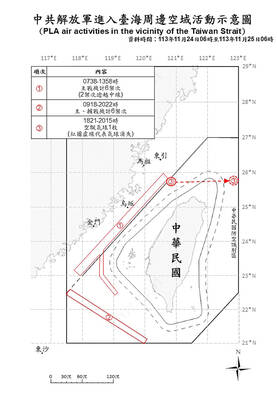The Health Promotion Administration (HPA) yesterday said that 190 people sought treatment for heat injuries at hospital emergency rooms (ERs) in the first 10 days of this month, and that not all of the injuries occurred outdoors.
Outdoor temperatures have on most days recently reached 35°C, and sometimes topped 37°C, resulting in a rise in heat injuries, it said, citing Central Weather Bureau statistics.
The types of injury are heat cramps, heat exhaustion and heat stroke, it said.

Photo: Huang Chih-yuan, Taipei Times
From July 1 to Friday, there were 190 ER visits for heat injuries, up from 116 visits a year earlier, or about 1.6 times higher, the HPA said, adding that not all of the cases occurred under a scorching sun.
The main cause of indoor heat injuries is poor ventilation, which causes the indoor temperature to rise rapidly, HPA Community Health Division head Lo Su-ying (羅素英) said, adding that heat injuries develop if people’s bodies are not regulating their temperature properly.
“Elderly people and children are usually less capable of regulating their body temperature, so they are more susceptible to oversweating and dehydration if room temperatures continue to rise, and they might have a heat injury,” she said.
In hot weather, people should drink water more frequently, not just when they feel thirsty, and avoid drinking alcohol or sugary beverages, the HPA said, adding that air-conditioners should be set at about 26°C or 27°C, or rooms should have good ventilation.
Wearing a thin jacket in air-conditioned buildings can prevent discomfort from sudden changes between indoor and outdoor temperatures, while wearing lightweight and loose-fitting clothing permits greater air circulation and evaporation of sweat, allowing the body to cool faster, it said.
Heat injury symptoms include rising body temperature, flushed skin, a rapid heartbeat, headache, dizziness, vomiting, weakness, cramps and confusion, Lo said.
Excessive heat can even cause a seizure or coma, Lo added.
People with symptoms should move to a cool place and try to lower their body temperature by removing excess clothing, drenching the skin with cool water or fanning the skin.
They should drink cool water with salt or an electrolyte drink, and be taken for medical treatment as soon as possible.

A decision to describe a Chinese Ministry of Foreign Affairs statement on Singapore’s Taiwan policy as “erroneous” was made because the city-state has its own “one China policy” and has not followed Beijing’s “one China principle,” Deputy Minister of Foreign Affairs Tien Chung-kwang (田中光) said yesterday. It has been a longstanding practice for the People’s Republic of China (PRC) to speak on other countries’ behalf concerning Taiwan, Tien said. The latest example was a statement issued by the PRC after a meeting between Singaporean Prime Minister Lawrence Wong (黃循財) and Chinese President Xi Jinping (習近平) on the sidelines of the APEC summit

Taiwan’s passport ranked 34th in the world, with access to 141 visa-free destinations, according to the latest update to the Henley Passport Index released today. The index put together by Henley & Partners ranks 199 passports globally based on the number of destinations holders can access without a visa out of 227, and is updated monthly. The 141 visa-free destinations for Taiwanese passport holders are a slight decrease from last year, when holders had access to 145 destinations. Botswana and Columbia are among the countries that have recently ended visa-free status for Taiwanese after “bowing to pressure from the Chinese government,” the Ministry

HEALTHCARE: Following a 2022 Constitutional Court ruling, Taiwanese traveling overseas for six months would no longer be able to suspend their insurance Measures allowing people to suspend National Health Insurance (NHI) services if they plan to leave the country for six months would be abolished starting Dec. 23, NHIA Director-General Shih Chung-liang (石崇良) said yesterday. The decision followed the Constitutional Court’s ruling in 2022 that the regulation was unconstitutional and that it would invalidate the regulation automatically unless the NHIA amended it to conform with the Constitution. The agency would amend the regulations to remove the articles and sections that allow the suspension of NHI services, and also introduce provisional clauses for those who suspended their NHI services before Dec. 23, Shih said. According to

‘GRAY ZONE’ TACTICS: China continues to build up its military capacity while regularly deploying jets and warships around Taiwan, with the latest balloon spotted on Sunday The US is drawing up contingency plans for military deployments in Japan and the Philippines in case of a Taiwan emergency, Japan’s Kyodo news agency reported. They would be incorporated in a first joint operation plan to be formulated in December, Kyodo reported late on Sunday, citing sources familiar with Japan-US relations. A US Marine Corps regiment that possesses High Mobility Artillery Rocket Systems — a light multiple rocket launcher — would be deployed along the Nansei Island chain stretching from Kyushu to Yonaguni near Taiwan, Kyodo said. According to US military guidelines for dispatching marines in small formations to several locations,